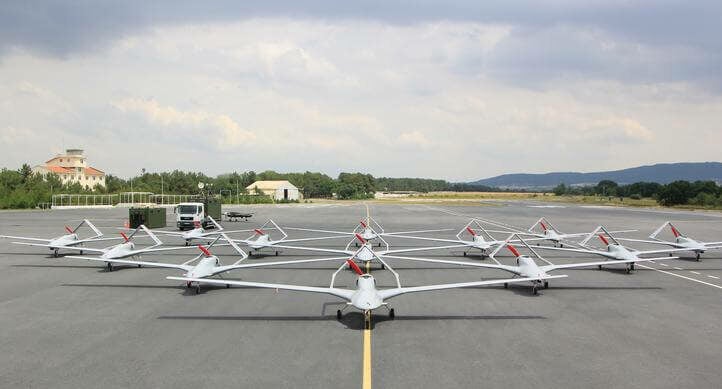A new report published by the Stockholm International Peace Research Institute (SIPRI) shows Turkey’s arms exports increased by 106 percent over the past four years, making it the 11th top exporter of arms worldwide.
According to the report Turkey’s arms exports surged by 106 percent from 2014-2018 to 2019–2023, while its share of global arms exports stood at 1.6 percent in the same period, making it the 11th largest exporter in the world among 66 countries exporting arms as documented by SIPRI.
During the 2014-18 period, Turkey’s share of global arms exports was 0.7 percent.
The United Arab Emirates was the leading importers of arms from Turkey in the 2019-23 period, making up 15 percent of Turkey’s arms exports, followed by Qatar at 13 percent and Pakistan at 11 percent.
The Turkish government says it is working to reduce Turkey’s dependence on foreign countries for arms and military equipment by investing more in the national defense industry, which has boomed over the past years. Turkey is now one of the world’s main exporters of armed drones.
Drones developed by Turkish defense contractor Baykar, whose chairman Selçuk Bayraktar is the son-in-law of Turkish President Recep Tayyip Erdoğan, have been exported to at least 30 countries and have been used in conflicts in Azerbaijan and Libya in addition to Ukraine. Many say the company owes its success to Erdoğan, who personally promotes Baykar drones during his visits to foreign countries, as a result of which agreements worth of millions of dollars are signed.
Turkey’s arms imports declined over the past four years by 29 percent, but the country is still the 17th largest arms importer among 170 countries. Its share of global arms imports stood at 1.6 percent during the 2019-23 period, while it was 2.2 percent in the 2014-18 period.
Turkey, followed by France, was the fourth largest supplier of arms to sub-Saharan Africa with a share of 6.3 percent, mostly due to its deliveries of combat helicopters to Nigeria and trainer/combat aircraft and uncrewed aerial vehicles (UAVs) to several states, the report said.
According to SIPRI, the five largest exporters of arms during the 2019-23 period — the US, France, Russia, China and Germany — accounted for 75 percent of all arms exports. US and French arms exports rose between 2014–18 and 2019–23, while Russian, Chinese and German arms exports fell. The US and countries in Western Europe together accounted for 72 percent of all arms exports in 2019–23, compared with 62 percent in 2014–18.
Russia’s arms exports, which have been facing international sanctions since the launch of its war on Ukraine in February 2022, fell by 53 percent between 2014–18 and 2019–23 and accounted for 11 percent of total global arms exports. It delivered major arms to 41 states and 1 non-state armed group in 2019–23.
Among the 170 states identified by SIPRI as importers of major arms in 2019–23, the top five arms importers were India, Saudi Arabia, Qatar, Ukraine and Pakistan — which received 35 percent of all arms imports in that period. States in Asia and Oceania accounted for 37 percent of all arms imports in 2019–23, followed by countries in the Middle East (30 percent), Europe (21 percent), the Americas (5.7 percent) and Africa (4.3 percent).
Arms imports and the war in Ukraine
The SIPRI report showed at least 30 countries supplied major arms to Ukraine after the full-scale Russian invasion in February 2022, mostly as military aid, meaning that Ukraine was by some distance the world’s largest arms importer in 2023. The US supplied 39 percent of Ukrainian arms imports in 2019–23, followed by Germany (14 percent) and Poland (13 percent). To broaden Ukraine’s military capabilities, suppliers began to deliver long-range systems in 2023. For example, Poland and Slovakia donated 27 surplus combat aircraft, and France and the UK supplied missiles with a range of 300 kilometers. During the year, Belgium, Denmark, the Netherlands and Norway also started to prepare the delivery of over 50 surplus combat aircraft.
Turkey has also provided Ukraine with armed drones manufactured by Baykar, which gained significant recognition for their effectiveness in countering Russian forces in Ukraine, particularly in the initial weeks of the Russian invasion, where they successfully countered Russian armor and anti-aircraft systems. In addition to importing drones from Turkey, Kyiv announced in July that the construction of a Turkish Bayraktar drone manufacturing plant had begun in Ukraine.
SIPRI is an independent international institute dedicated to research into conflict, armaments, arms control and disarmament. Established in 1966, SIPRI provides data, analysis and recommendations, based on open sources, to policymakers, researchers, media and the interested public.
